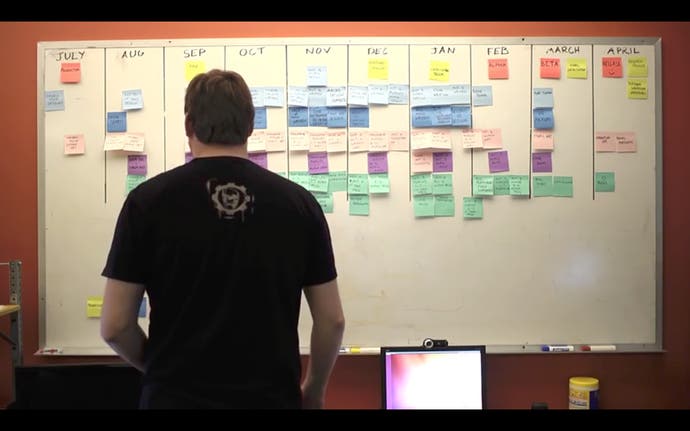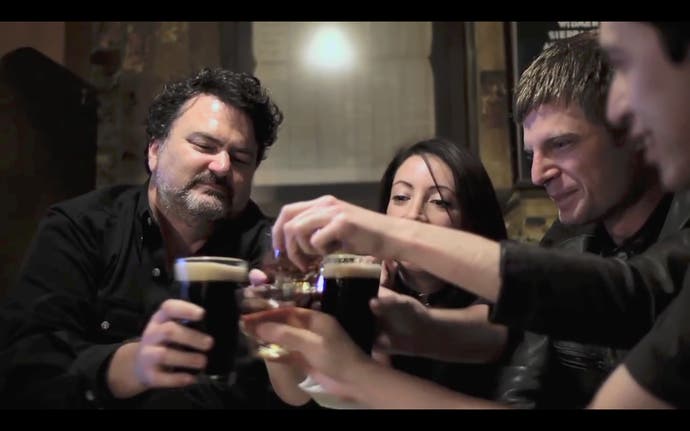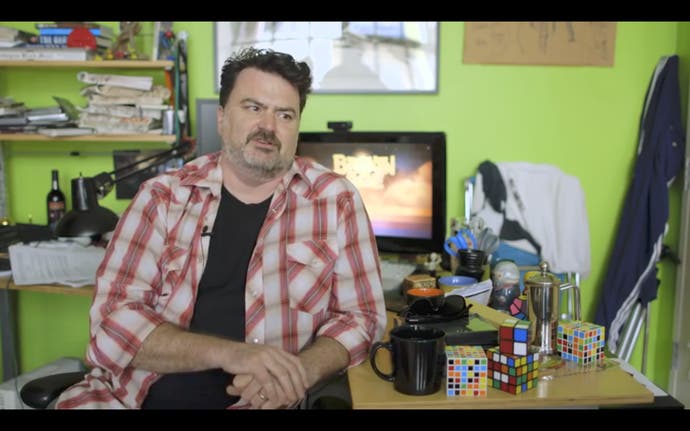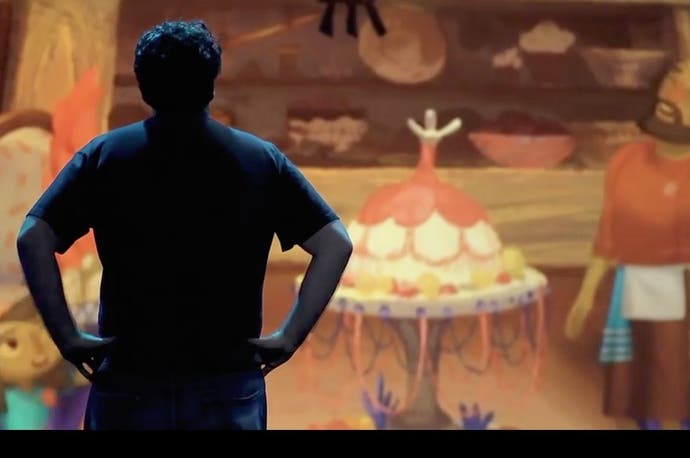Double Fine Adventure is the best video game documentary to date
Brutal legend.
Do you remember the New Yankee Workshop? It was a TV series hosted by Norm Abram, and each episode Norm would make something out of wood. A table, perhaps, or a chest of drawers, or maybe even some serving trays. When I first got Sky TV in the late 90s I became obsessed with the New Yankee Workshop, I would watch it daily despite having absolutely no intention of even picking up a saw. It was oddly comforting, probably for the same reason cookery shows are still amongst the most popular things on TV: people enjoy watching other people make things. Video game creation may not be as visceral as wood or food, but as the recently concluded Double Fine Adventure series proves, it's just as compelling.
It all started with an email. In 2011, Paul Owens of 2 Player Productions wrote to Greg Rice and Tim Schafer of Double Fine Productions with a unique proposition. They wanted to make a documentary series charting the development of a game from beginning to end. Something small, something modest. "If you guys plan to continue working on smaller games," wrote Owens, "the development cycle could be short enough that funding through Kickstarter could be within reason." A deal was struck, and when Double Fine launched a Kickstarter on the 9th of February 2012 for the development of what has now become Broken Age, a portion of the money raised was set aside for 2 Player Productions to allow them to document the development. They likely didn't realise it would be a three year series, but their efforts paid off. It's one of the best video game documentaries ever made.
Granted, there aren't that many. Many of the more popular ones like King of Kong, The Smash Brothers or Machinima's All Your History series tend to focus more on communities and cultural movements. The closest comparison to Double Fine Adventure would be Indie Game: The Movie, and while they do share similar aspects - underdog stories, flawed and visionary creatives, artistic sacrifices - the fact that Double Fine Adventure unfolded over such a time span gives it that much more scope and room to really get to know the team.

In fact comparing the two is a little unfair because I'm not even sure they're the same genre. Since Double Fine Adventure has been releasing episodes every few months for the better part of the last three years, it's probably closer in structure to a reality TV show, and it proves just as addictive. I've developed a relationship with this team and I'm always excited about the latest update. I've often stopped what I was doing to check out a new episode as soon as it arrives, social etiquette be damned. 'What are you watching?' 'I'm watching people make a video game!'
And boy, making video games looks hard. I mean, you know that, somewhere in the back of your head, but as much of a fan of games that I am, I only really had a vague understanding of the development process. The documentary series offered me a rich, detailed and emotional look at the agony and ecstasy of creating a video game. I think for fans it's incredible and important to have that perspective. For new developers, it's borderline essential.
Even if you don't really care about the development side it's still a great story; an underdog tale of artists trying to work outside the system. The fact that the game they're making is kind of a throw back (this was before the resurgence of adventure games brought on by The Walking Dead) only adds to this. It gives the whole thing a hint of the classic sports movie, a video game Rocky Balboa. It has high stakes too, as the game grows larger than anticipated, at moments it even threatens the very future of the company.
But how did the game get so big? You get a sense from the documentary that the wave of enthusiasm and goodwill felt through the Kickstarter permeated the company. When you've planned to develop a game for $300,000 and suddenly you have over $3 million and the world's press reporting on it, it's easy to see how you can get carried away. And so it's also easy to get caught up in the enthusiasm as Schafer and the artists put together this world. After a few months development and the wave of Kickstarter euphoria begins to wane, it becomes clear that to see this through to the end is going to require a lot more time and money than first anticipated.

Double Fine ultimately had to split the game in half, releasing Act One in January 2014 in an effort to raise enough money to finish the game and release Act Two. It's this kind of exuberance that causes many to remain skeptical of Kickstarter as a viable funding model, because despite the record breaking funding and a clear desire from fans, it still wasn't enough money to complete the game.
Whilst the game growing beyond the original designs may have been stressful for the company it is terrific for the documentary, and Double Fine should be applauded for their commitment to transparency in the face of it. Budgets, sales, staff contracts, dealing with the press, dealing with the fans, crunch time - all of it is laid bare and dealt with in an honest and open way. With a crunch approaching, animator Ray Crook shrugs and says he guesses he won't see much of his family for the next few weeks, we cut to Tim Schafer. "I say no, no don't do it," he says, clearly feeling uncomfortable with the situation. "Though I totally rely on him to do it so the schedule makes sense."
Tim Schafer is at the centre of the series. He's always engaging on camera, his love for the games they make is evident throughout, as is his ever present knack for making a joke even when faced with the frustration of keeping the studio afloat. His team do at times seem frustrated with how relaxed he can be faced with immense pressure and unworkable schedules, but there is a sense that he's seen it all before, and he knows, somehow, that things will just work out.

The first few episodes are rightfully focused on Schafer as he creates the game in his notebooks, but as the series progresses and we move more into the actual development of the game, the documentary shifts focus onto the team themselves. The belief they all have despite the turbulent development is contagious, and it's impossible not to root for them. When they first show the trailer for the game at GDC and the crowd give them a rapturous applause I wanted to stand and applaud too. But with great highs come great lows, like how heartbreaking it was to watch producer Greg Rice mournfully wipe away his painstakingly planned schedule from the whiteboard as he realises they've got no chance of hitting their deadlines.
As well as getting to know the team, the three year time space allows 2 Player Productions to really focus in on each aspect of game development, and a huge amount of praise has to be given for the technical polish on display. It is a handsome documentary, beautifully lit and, considering the volume of footage they must have, masterfully edited. With so much time afforded them, there are wonderful little details that are picked up that would have been cut from a regular documentary: Tim's myriad puzzle cubes, John Romero's hair blowing in the wind as he takes Tim for a drive in his Hot Rod, the satisfied 'Perfect!' from Peter McConnell as he remotely listens to the orchestra play his themes for the first time.
Double Fine Adventure is a hugely entertaining series which has set quite an important precedent that many other developers are picking up on. More open, honest dev diaries are becoming increasingly commonplace, and in a world where the relationship between creators and consumers can quickly turn antagonistic, it's a welcome trend. The transparent journey through production cycles that Double Fine Adventure help illustrate how fraught game development can be. They can change how you view games, and it certainly changed mine. The Double Fine Adventure is no longer locked to backers, you can watch the whole series here. I highly recommend that you do.
